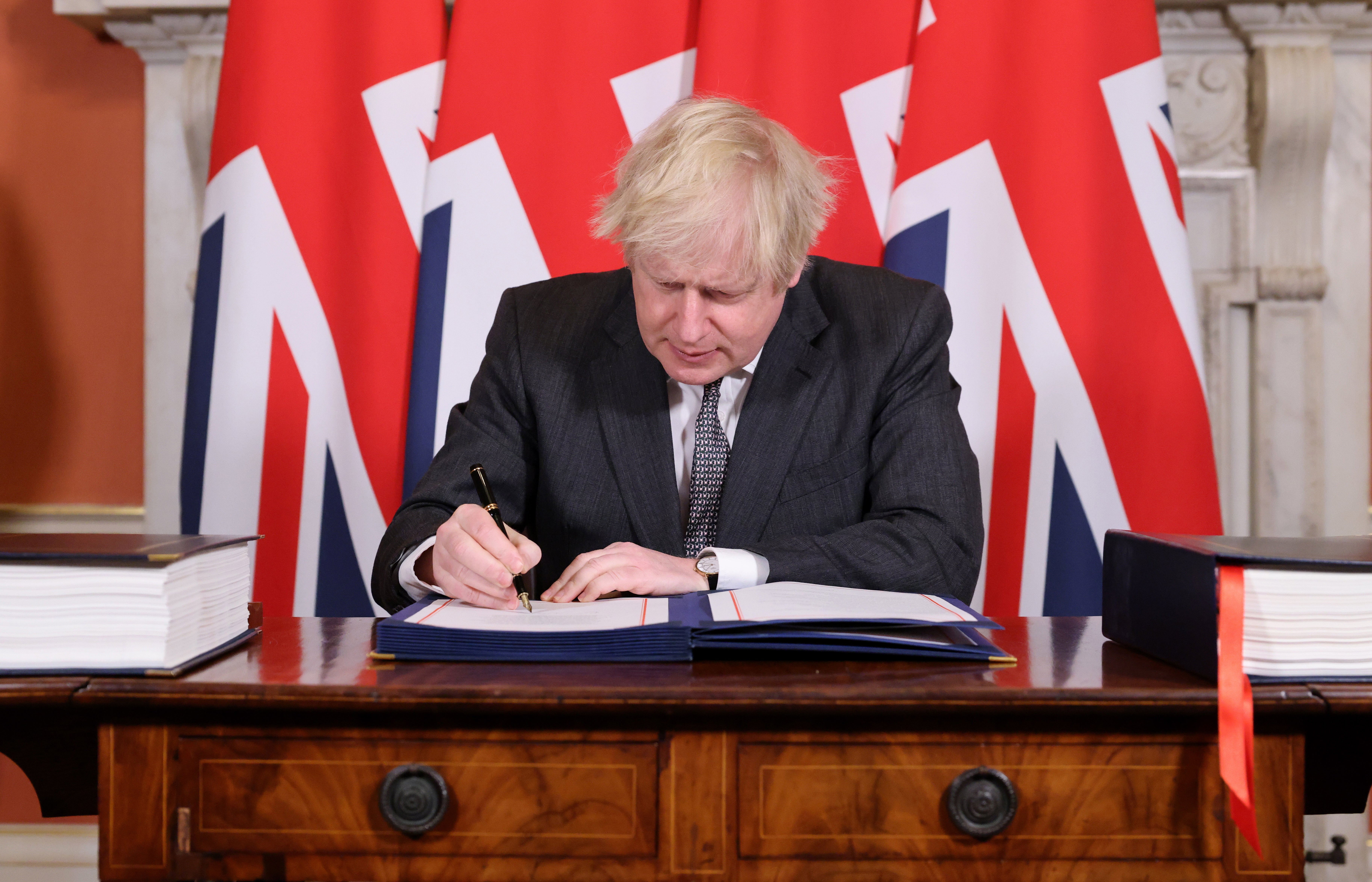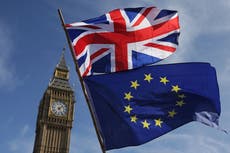Ignore what Boris Johnson says – the British public has never given its consent to this damaging Brexit deal
The prime minister is losing the backing of the people on Brexit, Covid and Scottish independence, so it’s up to the opposition parties to work together to fix the problem


Your support helps us to tell the story
From reproductive rights to climate change to Big Tech, The Independent is on the ground when the story is developing. Whether it's investigating the financials of Elon Musk's pro-Trump PAC or producing our latest documentary, 'The A Word', which shines a light on the American women fighting for reproductive rights, we know how important it is to parse out the facts from the messaging.
At such a critical moment in US history, we need reporters on the ground. Your donation allows us to keep sending journalists to speak to both sides of the story.
The Independent is trusted by Americans across the entire political spectrum. And unlike many other quality news outlets, we choose not to lock Americans out of our reporting and analysis with paywalls. We believe quality journalism should be available to everyone, paid for by those who can afford it.
Your support makes all the difference.The theme of 2021 is going to be consent. The public will need to consent to continued restrictions and to taking the vaccine. Scotland gave its consent to remain in the UK in 2014, but might seek to revoke that consent in 2021. Boris Johnson will try to say that he has our consent for the “bumps in the road” that his Brexit causes. Why? Because of a referendum that took place five years ago. And the opposition parties need to decide whether they’re going to work together to change our electoral system in the name of democratic consent.
The vaccines are being rolled out. There is a path to relatively normal life after a year of loneliness and economic paralysis. The key question now is, how many people will die before we get enough vulnerable people vaccinated? Keeping that number as low as possible requires the public to follow the restrictions on mask-wearing and social distancing.
But this government has ruled over the highest excess death rate in Europe, told people it was OK to shake hands when northern Italy was already locked down, botched test and trace, and prioritised saving a political adviser’s job over respect for their own lockdown rules. Consent to these restrictions, therefore, won’t come from a deep faith in the government, but from a desire to protect our neighbours and get our businesses back open.
All last year, we heard about countries having a V-shaped economic recovery – once you get rid of the virus, businesses should bounce back. Well, unlike the UK, other economies didn’t choose to erect trade barriers with their main trade partner. So sadly getting our businesses open and keeping them open after the vaccines have done their thing will be heavily impacted by Brexit.
Boris Johnson will try to say that this is what people voted for. Imagine being the DUP, though. You represent a significant part of the 52 per cent who voted for Brexit, but your entire ideology is based on keeping Northern Ireland as a uniform part of the UK. And then Boris Johnson says you voted for a Brexit that leaves Northern Ireland in the single market, while Great Britain sails away.
The fact is, none of the damage Brexit will do this year has the public’s democratic consent. At the election just before we left the EU, 52 per cent voted for parties that supported a second referendum. Meanwhile, the new 1,200-page treaty Johnson just signed was shown to our elected MPs just 48 hours before they had to either approve it or trigger a “no deal”, which is why Labour backed the deal. Forcing someone into a binary choice between two bad options does not mean you have their consent. Essentially, Labour just got a taste of what it’s like for the rest of us living under a two-party system.
The Conservatives won 44 per cent of the vote, but got 56 per cent of the seats, while Labour won 32 per cent of the vote, but 31 per cent of the seats. So Tory votes count for more, yet we call ourselves a democracy. If all votes had counted equally, then the majority of MPs would have been from second referendum parties, ie, we’d still be in the EU. But crucially for Labour, it would shift seats to parties that Labour can actually work with, at least on some areas.
But to deliver electoral reform, Labour would first need to win under the current system. And right now Labour is once again taking a Brexit-neutral stance which, as we’ve seen before, just gives more votes to the Liberal Democrats and Green Party, so an electoral pact is going to be necessary if the opposition parties are to win in 2024. The best way to achieve that is for Labour to commit to proportional representation. That way, Lib Dem and Green voters will know they can vote Labour in 2024, in order to make all of their parties’ future votes actually matter.
Added to this, if the majority keep voting for socially progressive parties, as we have done in 2017 and 2019, we can actually do something about Black Lives Matter, for example mandating the use of name-blind CVs. But actually delivering that will require the help of the SNP because Labour isn’t exactly doing well in Scotland. A commitment to fulfilling all of the promises made to Scotland in 2014 and not to stand in the way of an independence referendum after that would be a good basis for a Starmer-Sturgeon alliance. A written constitution which sets the principles of Scottish devolution in stone would help, too.
When 55 per cent of the Scottish people agreed to stay in the UK, that was after they were told by David Cameron that it was the best way to stay in the EU. In fact, between 2014 and 2016, Scotland voted to stay in an EU country, not once, but twice. Then, whenever Scottish MPs raised this point, those MPs were told: but you voted to stay in the UK and the UK voted to leave the EU. Anyone with any integrity knows Scotland’s consent has been violated, so they at least have the right to revisit the issue. And the more Westminster says “no”, the stronger the argument for independence becomes.
Boris Johnson is losing the consent of the public on Covid. He’s lost the consent of Scotland. He never had the public’s consent on his Brexit deal. Yet his policies are damaging the public in relation to all three. It’s up to the opposition parties to work together to fix that. As we enter the new normal, Keir Starmer has to prove that Labour is truly under new leadership, and has left tribal party politics behind. If he does, public consent for our politics will be renewed, and our progressive-voting country has a bright future. If he doesn’t, he’s part of the problem.




Join our commenting forum
Join thought-provoking conversations, follow other Independent readers and see their replies
Comments